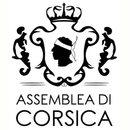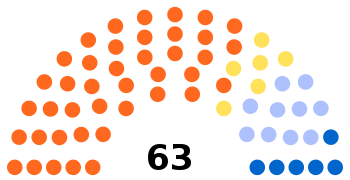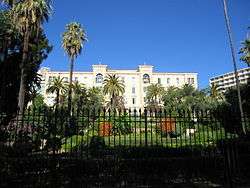Corsican Assembly
The Corsican Assembly (Corsican: Assemblea di Corsica; French: L'Assemblée de Corse) is the unicameral legislative body of the territorial collectivity of Corsica. It has its seat at the Grand Hôtel d'Ajaccio et Continental, in the Corsican capital of Ajaccio. After the 2017 territorial elections, the assembly was expanded from 51 to 63 seats, with the executive council expanding from 9 to 11 members (including the president).[1]
Corsican Assembly Assemblea di Corsica L'Assemblée de Corse | |
|---|---|
 | |
| Type | |
| Type | |
| History | |
| Founded | 2 March 1982 |
| Leadership | |
President of the Assembly | |
| Structure | |
| Seats | 63 |
 | |
Political groups |
|
| Elections | |
Last election | 2017 |
| Meeting place | |
 | |
| Grand Hôtel d'Ajaccio et Continental, Ajaccio | |
| Website | |
| www | |
History
Before 1975, Corsica was a département of the French region of Provence-Alpes-Côte d'Azur.
On 2 March 1982, a law was passed that gave Corsica the status of territorial collectivity (collectivité territoriale), abolishing the Corsican Regional Council which had existed before. Unlike the regional councils, the Corsican Assembly has executive powers over the island.
In 1992, three institutions were formed in the territorial collectivity of Corsica:
- The Executive Council of Corsica, which exercises the type of executive functions held in other French regions by the Presidents of the Regional Councils. It ensures the stability and consistency needed to manage the affairs of the territory;
- The Corsican Assembly, a deliberative, unicameral legislative body with greater powers than the regional councils on the mainland;
- The Economic, Social and Cultural Council of Corsica, an advisory body.
Terminology
Members of the Corsican Assembly were first called "territorial councillors" in reference to Corsica's status as a collectivité territoriale. Members are now called "Councillors of the Corsican Assembly", or in unofficial and everyday speech, just "Councillors".
Powers
- Economic development
- Taxation
- Energy
- Environment
- Housing
- Education and training
- Language
- Transport
- Forestry and agriculture
- Culture
- Tourism
- Sports & youth
Composition
There are 63 members of the Assembly, elected for a six-year term via a closed party list and two rounds of voting. To pass beyond the first round, a candidate requires an absolute majority, whereas in the second round a plurality is sufficient.
The list that wins in the first or second round automatically obtains three seats as a "premium to the majority". The other seats are distributed based on proportional representation.
At the first meeting of Assembly Councillors after an election, the councillors elect an Assembly President in a plurality ballot. This is also a two round contest, with an absolute majority required to proceed to the second round. At the same time as the election of the President, the Assembly also elects the ten members that will make up the President's Committee (bureau).
In contrast to the executives of the regional councils, Assembly Councillors may not also be members of the Corsican Executive Council. Election to the executive requires resignation from the Assembly.
Results
 | ||||||||
| Leader | List | First round | Second round | Seats | ||||
|---|---|---|---|---|---|---|---|---|
| Votes | % | Votes | % | Seats | % | |||
| Gilles Simeoni | PaC (FC–CL) | 54,212 | 45.36 | 67,253 | 56.46 | 41 | 65.08 | |
| Jean-Martin Mondoloni | Regionalist right | 17,891 | 14.97 | 21,784 | 18.29 | 10 | 15.87 | |
| Jean-Charles Orsucci | REM | 13,455 | 11.26 | 15,080 | 12.66 | 6 | 9.52 | |
| Valérie Bozzi | DVD (LR support) | 15,265 | 12.77 | 14,990 | 12.59 | 6 | 9.52 | |
| Paul-Félix Benedetti | Rinnovu | 7,996 | 6.69 | |||||
| Jacques Casamarta | CI–PCF | 6,787 | 5.68 | |||||
| Charles Giacomi | FN | 3,917 | 3.28 | |||||
| Total | 119,523 | 100.00 | 119,107 | 100.00 | 63 | 100.00 | ||
| Valid votes | 119,523 | 97.91 | 119,107 | 96.75 | ||||
| Blank votes | 1,251 | 1.02 | 2,079 | 1.69 | ||||
| Null votes | 1,301 | 1.07 | 1,923 | 1.56 | ||||
| Turnout | 122,075 | 52.10 | 123,109 | 52.55 | ||||
| Abstentions | 112,213 | 47.90 | 111,180 | 47.45 | ||||
| Registered voters | 234,288 | 234,289 | ||||||
| Source: Ministry of the Interior (first round), Ministry of the Interior (second round) | ||||||||
Presidents of the Corsican Assembly
- 1974–1979: François Giacobbi
- 1979–1982: Jean Filippi
- 1982–1984: Prosper Alfonsi
- 1984–1998: Jean-Paul de Rocca-Serra
- 1998–2004: José Rossi
- 2004–2010: Camille de Rocca Serra
- 2010–2015: Dominique Bucchini
- 17 December 2015: Jean-Guy Talamoni
Assembly members
Members since 2015:
See also
References
- Morgane Rubetti (1 December 2017). "Corse : cinq questions pour comprendre les élections territoriales". Le Figaro. Retrieved 2 December 2017.
External links
- Website of the L'Assemblée de Corse / L'Assemblea di Corsica (in French) (Corsican)